Fate vs Free Will in Oedipus Rex
VerifiedAdded on 2023/05/29
|6
|1673
|138
AI Summary
This essay analyzes the themes of fate and free will in Sophocles' Oedipus Rex, focusing on the main character's struggle for truth and the point at which he realizes his destiny is preordained. It also discusses the extent to which Oedipus' judgement of prophesy was compromised by the state of Tiresias' blindness and whether he could have changed his fate. The essay examines the characters of Oedipus, Creon, Jocasta, and Teiresias and their roles in the play.
Contribute Materials
Your contribution can guide someone’s learning journey. Share your
documents today.
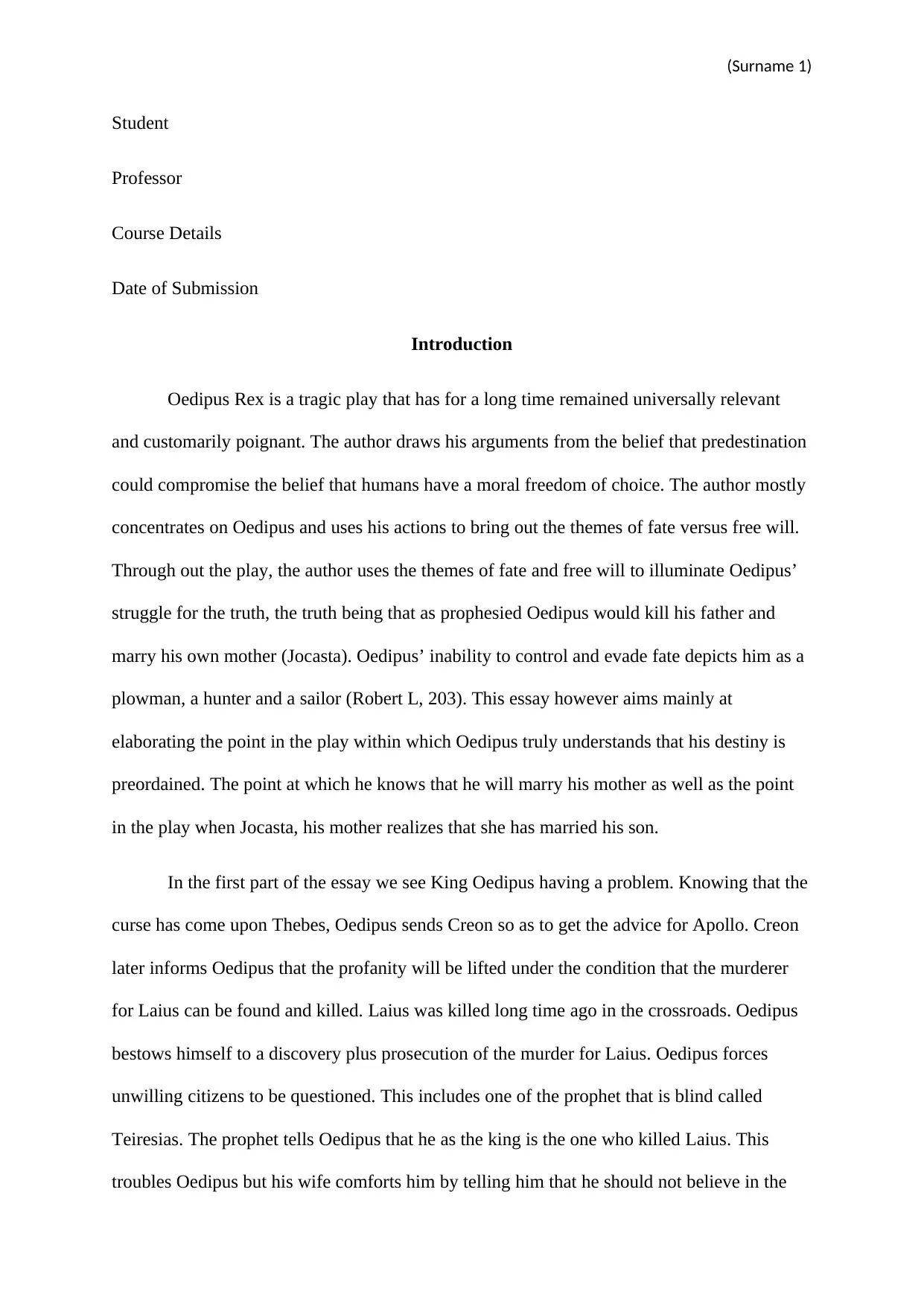
(Surname 1)
Student
Professor
Course Details
Date of Submission
Introduction
Oedipus Rex is a tragic play that has for a long time remained universally relevant
and customarily poignant. The author draws his arguments from the belief that predestination
could compromise the belief that humans have a moral freedom of choice. The author mostly
concentrates on Oedipus and uses his actions to bring out the themes of fate versus free will.
Through out the play, the author uses the themes of fate and free will to illuminate Oedipus’
struggle for the truth, the truth being that as prophesied Oedipus would kill his father and
marry his own mother (Jocasta). Oedipus’ inability to control and evade fate depicts him as a
plowman, a hunter and a sailor (Robert L, 203). This essay however aims mainly at
elaborating the point in the play within which Oedipus truly understands that his destiny is
preordained. The point at which he knows that he will marry his mother as well as the point
in the play when Jocasta, his mother realizes that she has married his son.
In the first part of the essay we see King Oedipus having a problem. Knowing that the
curse has come upon Thebes, Oedipus sends Creon so as to get the advice for Apollo. Creon
later informs Oedipus that the profanity will be lifted under the condition that the murderer
for Laius can be found and killed. Laius was killed long time ago in the crossroads. Oedipus
bestows himself to a discovery plus prosecution of the murder for Laius. Oedipus forces
unwilling citizens to be questioned. This includes one of the prophet that is blind called
Teiresias. The prophet tells Oedipus that he as the king is the one who killed Laius. This
troubles Oedipus but his wife comforts him by telling him that he should not believe in the
Student
Professor
Course Details
Date of Submission
Introduction
Oedipus Rex is a tragic play that has for a long time remained universally relevant
and customarily poignant. The author draws his arguments from the belief that predestination
could compromise the belief that humans have a moral freedom of choice. The author mostly
concentrates on Oedipus and uses his actions to bring out the themes of fate versus free will.
Through out the play, the author uses the themes of fate and free will to illuminate Oedipus’
struggle for the truth, the truth being that as prophesied Oedipus would kill his father and
marry his own mother (Jocasta). Oedipus’ inability to control and evade fate depicts him as a
plowman, a hunter and a sailor (Robert L, 203). This essay however aims mainly at
elaborating the point in the play within which Oedipus truly understands that his destiny is
preordained. The point at which he knows that he will marry his mother as well as the point
in the play when Jocasta, his mother realizes that she has married his son.
In the first part of the essay we see King Oedipus having a problem. Knowing that the
curse has come upon Thebes, Oedipus sends Creon so as to get the advice for Apollo. Creon
later informs Oedipus that the profanity will be lifted under the condition that the murderer
for Laius can be found and killed. Laius was killed long time ago in the crossroads. Oedipus
bestows himself to a discovery plus prosecution of the murder for Laius. Oedipus forces
unwilling citizens to be questioned. This includes one of the prophet that is blind called
Teiresias. The prophet tells Oedipus that he as the king is the one who killed Laius. This
troubles Oedipus but his wife comforts him by telling him that he should not believe in the
Secure Best Marks with AI Grader
Need help grading? Try our AI Grader for instant feedback on your assignments.
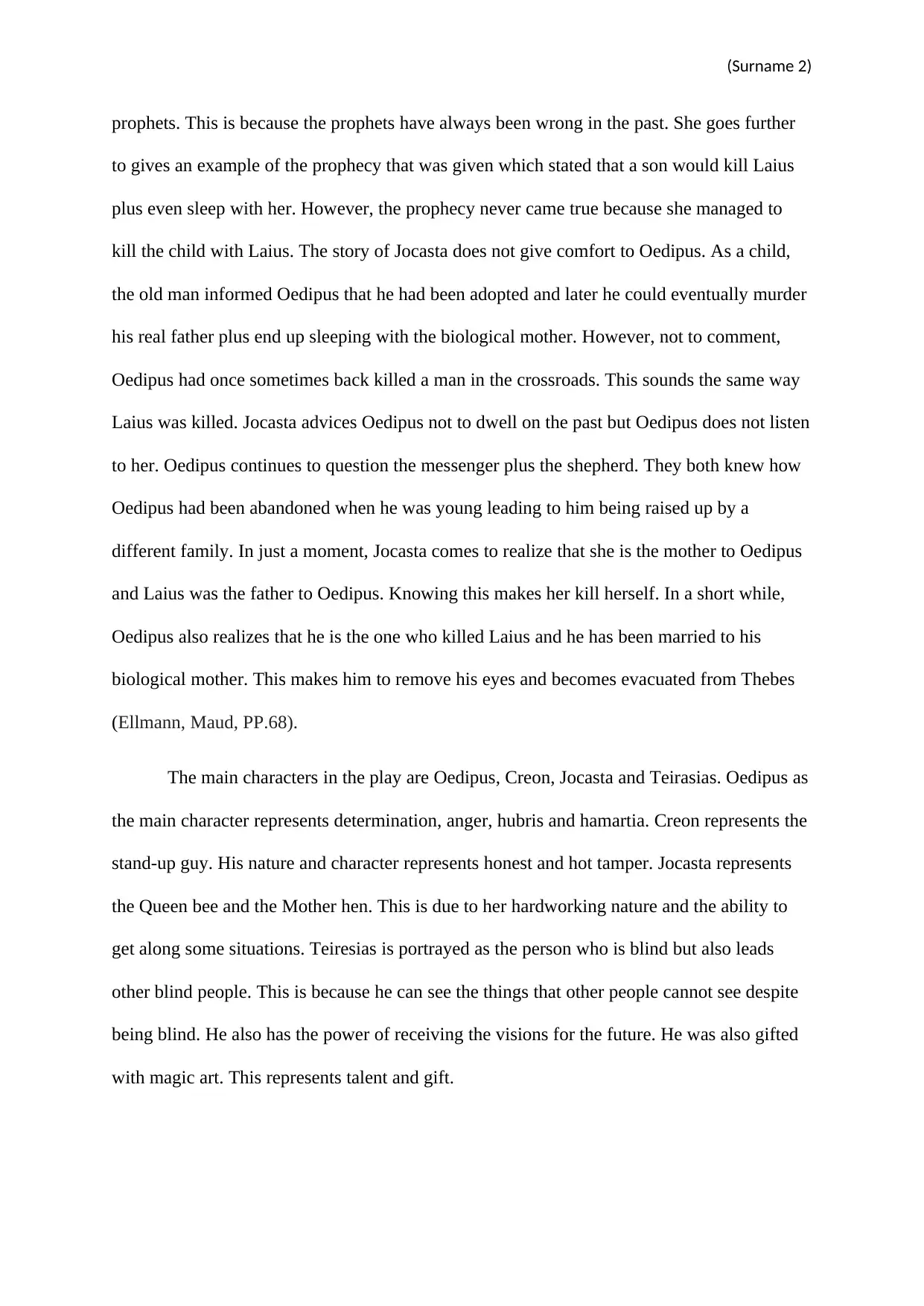
(Surname 2)
prophets. This is because the prophets have always been wrong in the past. She goes further
to gives an example of the prophecy that was given which stated that a son would kill Laius
plus even sleep with her. However, the prophecy never came true because she managed to
kill the child with Laius. The story of Jocasta does not give comfort to Oedipus. As a child,
the old man informed Oedipus that he had been adopted and later he could eventually murder
his real father plus end up sleeping with the biological mother. However, not to comment,
Oedipus had once sometimes back killed a man in the crossroads. This sounds the same way
Laius was killed. Jocasta advices Oedipus not to dwell on the past but Oedipus does not listen
to her. Oedipus continues to question the messenger plus the shepherd. They both knew how
Oedipus had been abandoned when he was young leading to him being raised up by a
different family. In just a moment, Jocasta comes to realize that she is the mother to Oedipus
and Laius was the father to Oedipus. Knowing this makes her kill herself. In a short while,
Oedipus also realizes that he is the one who killed Laius and he has been married to his
biological mother. This makes him to remove his eyes and becomes evacuated from Thebes
(Ellmann, Maud, PP.68).
The main characters in the play are Oedipus, Creon, Jocasta and Teirasias. Oedipus as
the main character represents determination, anger, hubris and hamartia. Creon represents the
stand-up guy. His nature and character represents honest and hot tamper. Jocasta represents
the Queen bee and the Mother hen. This is due to her hardworking nature and the ability to
get along some situations. Teiresias is portrayed as the person who is blind but also leads
other blind people. This is because he can see the things that other people cannot see despite
being blind. He also has the power of receiving the visions for the future. He was also gifted
with magic art. This represents talent and gift.
prophets. This is because the prophets have always been wrong in the past. She goes further
to gives an example of the prophecy that was given which stated that a son would kill Laius
plus even sleep with her. However, the prophecy never came true because she managed to
kill the child with Laius. The story of Jocasta does not give comfort to Oedipus. As a child,
the old man informed Oedipus that he had been adopted and later he could eventually murder
his real father plus end up sleeping with the biological mother. However, not to comment,
Oedipus had once sometimes back killed a man in the crossroads. This sounds the same way
Laius was killed. Jocasta advices Oedipus not to dwell on the past but Oedipus does not listen
to her. Oedipus continues to question the messenger plus the shepherd. They both knew how
Oedipus had been abandoned when he was young leading to him being raised up by a
different family. In just a moment, Jocasta comes to realize that she is the mother to Oedipus
and Laius was the father to Oedipus. Knowing this makes her kill herself. In a short while,
Oedipus also realizes that he is the one who killed Laius and he has been married to his
biological mother. This makes him to remove his eyes and becomes evacuated from Thebes
(Ellmann, Maud, PP.68).
The main characters in the play are Oedipus, Creon, Jocasta and Teirasias. Oedipus as
the main character represents determination, anger, hubris and hamartia. Creon represents the
stand-up guy. His nature and character represents honest and hot tamper. Jocasta represents
the Queen bee and the Mother hen. This is due to her hardworking nature and the ability to
get along some situations. Teiresias is portrayed as the person who is blind but also leads
other blind people. This is because he can see the things that other people cannot see despite
being blind. He also has the power of receiving the visions for the future. He was also gifted
with magic art. This represents talent and gift.
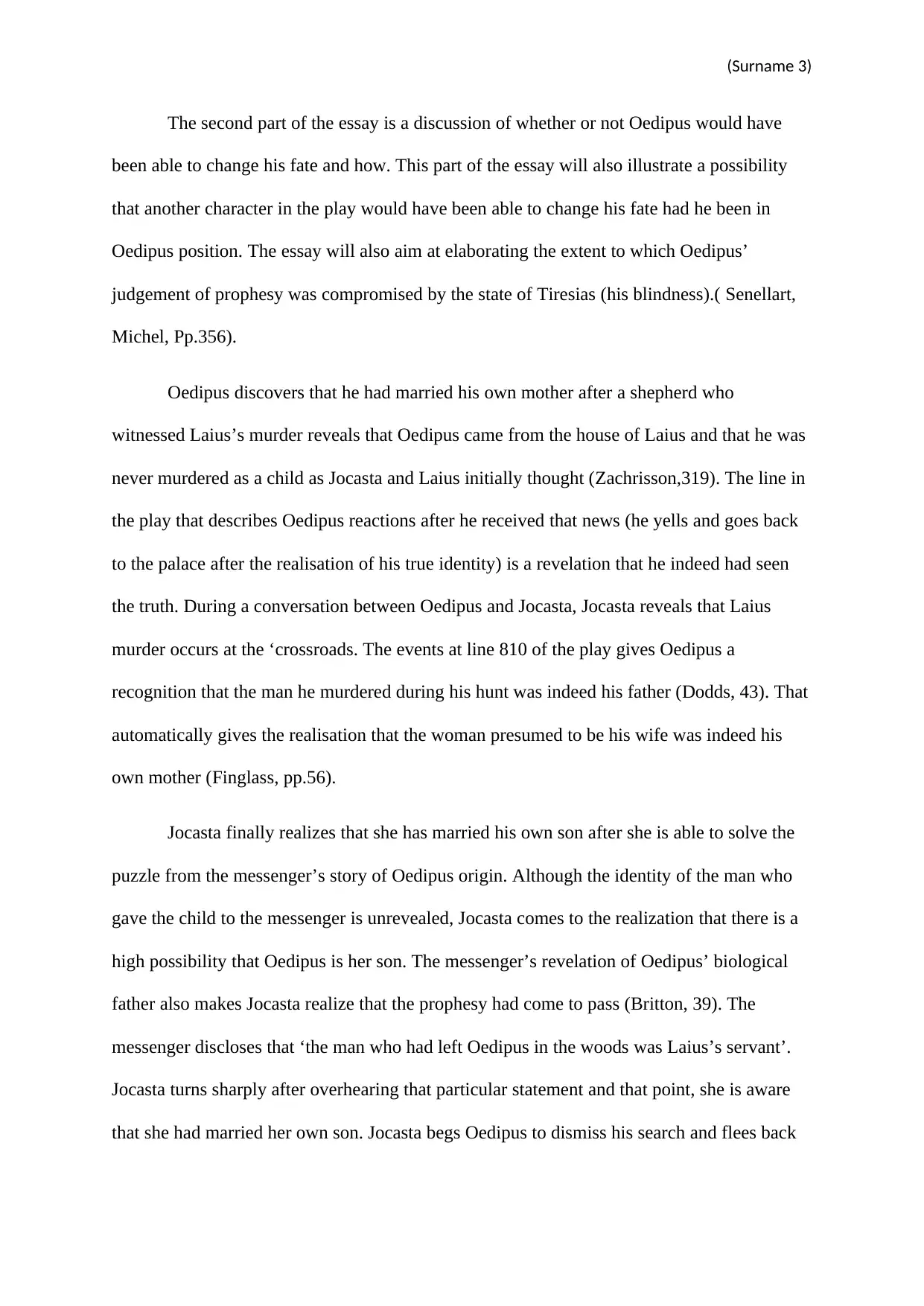
(Surname 3)
The second part of the essay is a discussion of whether or not Oedipus would have
been able to change his fate and how. This part of the essay will also illustrate a possibility
that another character in the play would have been able to change his fate had he been in
Oedipus position. The essay will also aim at elaborating the extent to which Oedipus’
judgement of prophesy was compromised by the state of Tiresias (his blindness).( Senellart,
Michel, Pp.356).
Oedipus discovers that he had married his own mother after a shepherd who
witnessed Laius’s murder reveals that Oedipus came from the house of Laius and that he was
never murdered as a child as Jocasta and Laius initially thought (Zachrisson,319). The line in
the play that describes Oedipus reactions after he received that news (he yells and goes back
to the palace after the realisation of his true identity) is a revelation that he indeed had seen
the truth. During a conversation between Oedipus and Jocasta, Jocasta reveals that Laius
murder occurs at the ‘crossroads. The events at line 810 of the play gives Oedipus a
recognition that the man he murdered during his hunt was indeed his father (Dodds, 43). That
automatically gives the realisation that the woman presumed to be his wife was indeed his
own mother (Finglass, pp.56).
Jocasta finally realizes that she has married his own son after she is able to solve the
puzzle from the messenger’s story of Oedipus origin. Although the identity of the man who
gave the child to the messenger is unrevealed, Jocasta comes to the realization that there is a
high possibility that Oedipus is her son. The messenger’s revelation of Oedipus’ biological
father also makes Jocasta realize that the prophesy had come to pass (Britton, 39). The
messenger discloses that ‘the man who had left Oedipus in the woods was Laius’s servant’.
Jocasta turns sharply after overhearing that particular statement and that point, she is aware
that she had married her own son. Jocasta begs Oedipus to dismiss his search and flees back
The second part of the essay is a discussion of whether or not Oedipus would have
been able to change his fate and how. This part of the essay will also illustrate a possibility
that another character in the play would have been able to change his fate had he been in
Oedipus position. The essay will also aim at elaborating the extent to which Oedipus’
judgement of prophesy was compromised by the state of Tiresias (his blindness).( Senellart,
Michel, Pp.356).
Oedipus discovers that he had married his own mother after a shepherd who
witnessed Laius’s murder reveals that Oedipus came from the house of Laius and that he was
never murdered as a child as Jocasta and Laius initially thought (Zachrisson,319). The line in
the play that describes Oedipus reactions after he received that news (he yells and goes back
to the palace after the realisation of his true identity) is a revelation that he indeed had seen
the truth. During a conversation between Oedipus and Jocasta, Jocasta reveals that Laius
murder occurs at the ‘crossroads. The events at line 810 of the play gives Oedipus a
recognition that the man he murdered during his hunt was indeed his father (Dodds, 43). That
automatically gives the realisation that the woman presumed to be his wife was indeed his
own mother (Finglass, pp.56).
Jocasta finally realizes that she has married his own son after she is able to solve the
puzzle from the messenger’s story of Oedipus origin. Although the identity of the man who
gave the child to the messenger is unrevealed, Jocasta comes to the realization that there is a
high possibility that Oedipus is her son. The messenger’s revelation of Oedipus’ biological
father also makes Jocasta realize that the prophesy had come to pass (Britton, 39). The
messenger discloses that ‘the man who had left Oedipus in the woods was Laius’s servant’.
Jocasta turns sharply after overhearing that particular statement and that point, she is aware
that she had married her own son. Jocasta begs Oedipus to dismiss his search and flees back
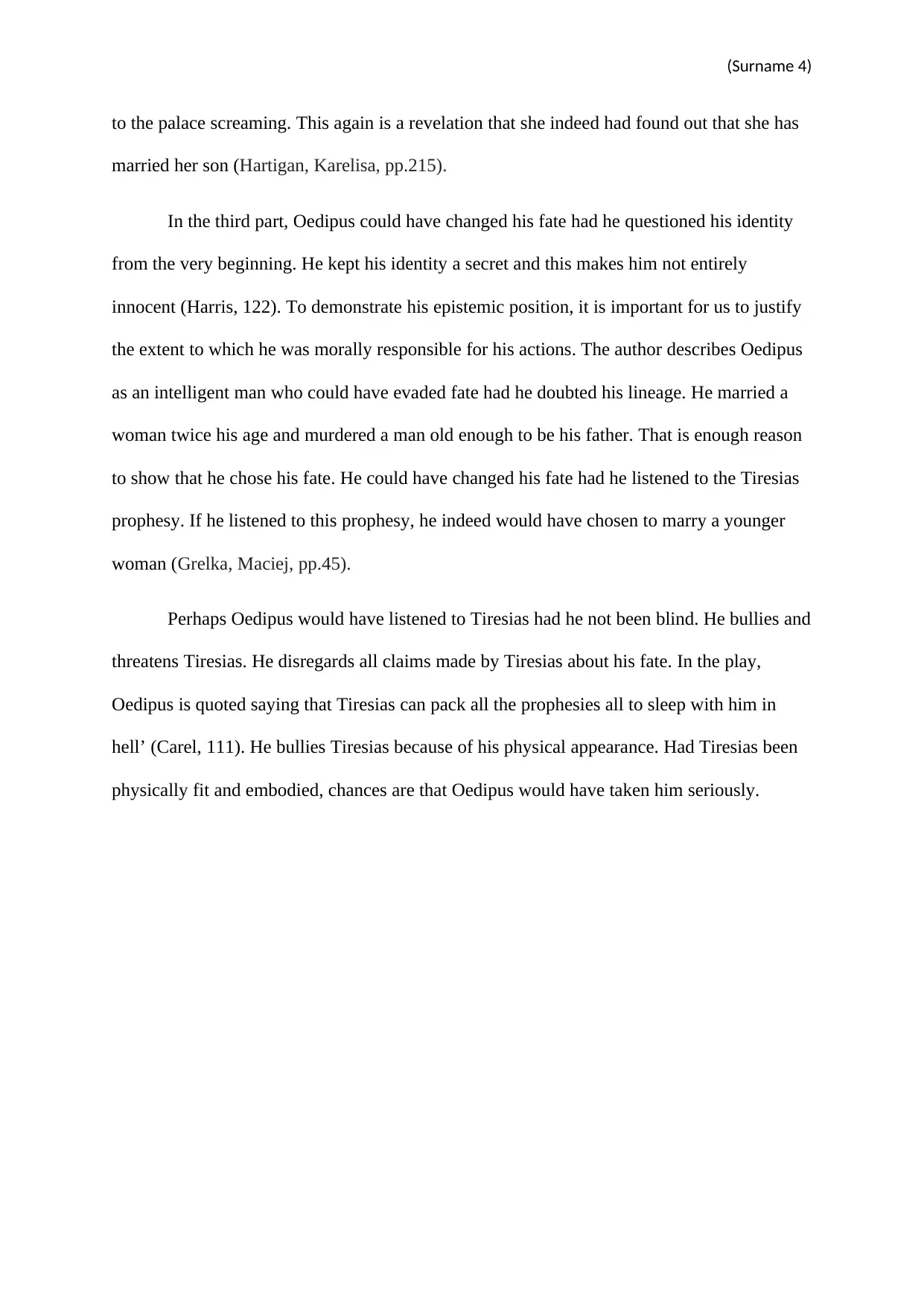
(Surname 4)
to the palace screaming. This again is a revelation that she indeed had found out that she has
married her son (Hartigan, Karelisa, pp.215).
In the third part, Oedipus could have changed his fate had he questioned his identity
from the very beginning. He kept his identity a secret and this makes him not entirely
innocent (Harris, 122). To demonstrate his epistemic position, it is important for us to justify
the extent to which he was morally responsible for his actions. The author describes Oedipus
as an intelligent man who could have evaded fate had he doubted his lineage. He married a
woman twice his age and murdered a man old enough to be his father. That is enough reason
to show that he chose his fate. He could have changed his fate had he listened to the Tiresias
prophesy. If he listened to this prophesy, he indeed would have chosen to marry a younger
woman (Grelka, Maciej, pp.45).
Perhaps Oedipus would have listened to Tiresias had he not been blind. He bullies and
threatens Tiresias. He disregards all claims made by Tiresias about his fate. In the play,
Oedipus is quoted saying that Tiresias can pack all the prophesies all to sleep with him in
hell’ (Carel, 111). He bullies Tiresias because of his physical appearance. Had Tiresias been
physically fit and embodied, chances are that Oedipus would have taken him seriously.
to the palace screaming. This again is a revelation that she indeed had found out that she has
married her son (Hartigan, Karelisa, pp.215).
In the third part, Oedipus could have changed his fate had he questioned his identity
from the very beginning. He kept his identity a secret and this makes him not entirely
innocent (Harris, 122). To demonstrate his epistemic position, it is important for us to justify
the extent to which he was morally responsible for his actions. The author describes Oedipus
as an intelligent man who could have evaded fate had he doubted his lineage. He married a
woman twice his age and murdered a man old enough to be his father. That is enough reason
to show that he chose his fate. He could have changed his fate had he listened to the Tiresias
prophesy. If he listened to this prophesy, he indeed would have chosen to marry a younger
woman (Grelka, Maciej, pp.45).
Perhaps Oedipus would have listened to Tiresias had he not been blind. He bullies and
threatens Tiresias. He disregards all claims made by Tiresias about his fate. In the play,
Oedipus is quoted saying that Tiresias can pack all the prophesies all to sleep with him in
hell’ (Carel, 111). He bullies Tiresias because of his physical appearance. Had Tiresias been
physically fit and embodied, chances are that Oedipus would have taken him seriously.
Secure Best Marks with AI Grader
Need help grading? Try our AI Grader for instant feedback on your assignments.
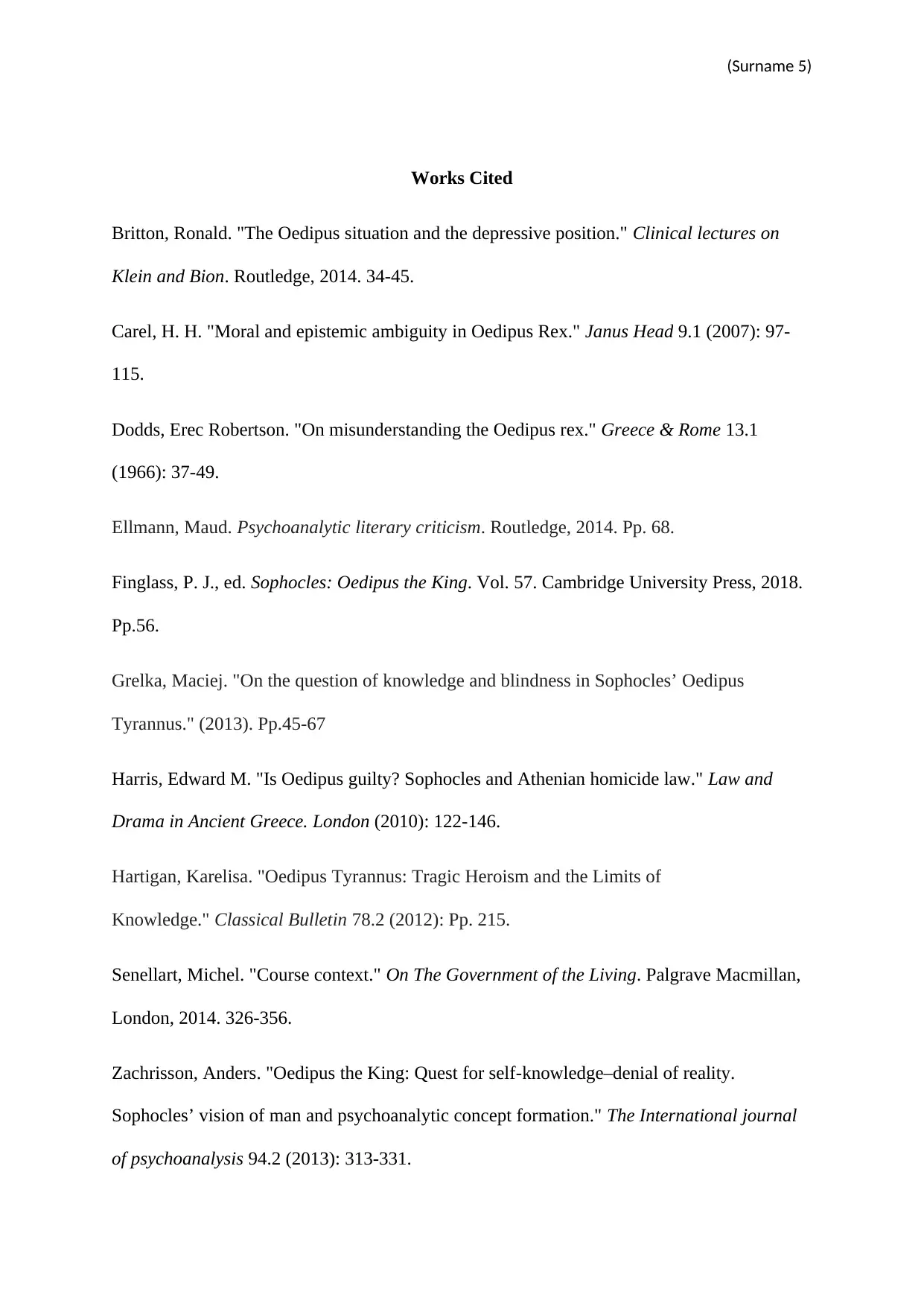
(Surname 5)
Works Cited
Britton, Ronald. "The Oedipus situation and the depressive position." Clinical lectures on
Klein and Bion. Routledge, 2014. 34-45.
Carel, H. Н. "Moral and epistemic ambiguity in Oedipus Rex." Janus Head 9.1 (2007): 97-
115.
Dodds, Erec Robertson. "On misunderstanding the Oedipus rex." Greece & Rome 13.1
(1966): 37-49.
Ellmann, Maud. Psychoanalytic literary criticism. Routledge, 2014. Pp. 68.
Finglass, P. J., ed. Sophocles: Oedipus the King. Vol. 57. Cambridge University Press, 2018.
Pp.56.
Grelka, Maciej. "On the question of knowledge and blindness in Sophocles’ Oedipus
Tyrannus." (2013). Pp.45-67
Harris, Edward M. "Is Oedipus guilty? Sophocles and Athenian homicide law." Law and
Drama in Ancient Greece. London (2010): 122-146.
Hartigan, Karelisa. "Oedipus Tyrannus: Tragic Heroism and the Limits of
Knowledge." Classical Bulletin 78.2 (2012): Pp. 215.
Senellart, Michel. "Course context." On The Government of the Living. Palgrave Macmillan,
London, 2014. 326-356.
Zachrisson, Anders. "Oedipus the King: Quest for self‐knowledge–denial of reality.
Sophocles’ vision of man and psychoanalytic concept formation." The International journal
of psychoanalysis 94.2 (2013): 313-331.
Works Cited
Britton, Ronald. "The Oedipus situation and the depressive position." Clinical lectures on
Klein and Bion. Routledge, 2014. 34-45.
Carel, H. Н. "Moral and epistemic ambiguity in Oedipus Rex." Janus Head 9.1 (2007): 97-
115.
Dodds, Erec Robertson. "On misunderstanding the Oedipus rex." Greece & Rome 13.1
(1966): 37-49.
Ellmann, Maud. Psychoanalytic literary criticism. Routledge, 2014. Pp. 68.
Finglass, P. J., ed. Sophocles: Oedipus the King. Vol. 57. Cambridge University Press, 2018.
Pp.56.
Grelka, Maciej. "On the question of knowledge and blindness in Sophocles’ Oedipus
Tyrannus." (2013). Pp.45-67
Harris, Edward M. "Is Oedipus guilty? Sophocles and Athenian homicide law." Law and
Drama in Ancient Greece. London (2010): 122-146.
Hartigan, Karelisa. "Oedipus Tyrannus: Tragic Heroism and the Limits of
Knowledge." Classical Bulletin 78.2 (2012): Pp. 215.
Senellart, Michel. "Course context." On The Government of the Living. Palgrave Macmillan,
London, 2014. 326-356.
Zachrisson, Anders. "Oedipus the King: Quest for self‐knowledge–denial of reality.
Sophocles’ vision of man and psychoanalytic concept formation." The International journal
of psychoanalysis 94.2 (2013): 313-331.

(Surname 6)
1 out of 6
Related Documents
Your All-in-One AI-Powered Toolkit for Academic Success.
+13062052269
info@desklib.com
Available 24*7 on WhatsApp / Email
![[object Object]](/_next/static/media/star-bottom.7253800d.svg)
Unlock your academic potential
© 2024 | Zucol Services PVT LTD | All rights reserved.





